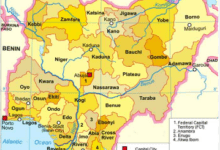
The Role Of Judiciary In The Implementation Of Law In Nigeria
The Role Of the Judiciary In The Implementation Of Law In Nigeria? – Judiciary plays a crucial role in the implementation of law by interpreting and applying the law impartially and making decisions based on the evidence presented. It also protects the rights of citizens by acting as a check on the actions of other branches of government and ensuring that they operate within the limits set by the law. In order for the judiciary to fulfill its role effectively, it must be independent and free from political interference. This allows it to make decisions based on the law and the facts of the case, rather than being influenced by external pressures. In this article, we will talk more in the roles of judiciary in the implementation of law in Nigeria. In this article we will discuss the role of judiciary in the implementation of law in Nigeria.
Read Also: The Role Of Central Bank In Economic Development Of Nigeria
👉 Relocate to Canada Today!
Live, Study and Work in Canada. No Payment is Required! Hurry Now click here to Apply >> Immigrate to CanadaWhat Is Law?
Law is a system of rules and guidelines which are enforced through social institutions to govern behavior, wherever possible. It shapes politics, economics, and society in numerous ways and serves as a social mediator of relations between people. Law is a system that regulates and ensures that individuals or a community adhere to the will of the state. Law is a system that has been developed over time to regulate the behavior of individuals and organizations in a society. It serves as a framework for the creation of social order, and it establishes the rules and guidelines that individuals and organizations must follow in order to live in a stable and orderly society.
Types Of Law In Nigeria?
There are many different types of law, and the specific types of law that exist can vary depending on the jurisdiction in which they are enacted. Here are five common types of law:
1. Criminal Law:
Criminal law is the body of law that deals with crime and punishment. It defines what actions are considered to be crimes, and it sets out the punishments that can be imposed on individuals who are found guilty of committing crimes.The Role Of Judiciary In The Implementation Of Law In Nigeria
2. Civil Law:
Civil law is the body of law that deals with disputes between individuals or organizations. It covers a wide range of legal issues, including contracts, torts, and property disputes.
3. Administrative Law:
Administrative law is the body of law that deals with the powers and procedures of governmental agencies. It covers issues such as the regulation of businesses, the provision of government services, and the protection of individual rights.
Read Also: The Role Of Commercial Bank In Economic Development In Nigeria
4. Tax Law:
Tax law is the body of law that deals with the rules and regulations related to the collection of taxes by the government. It includes issues such as the calculation of taxes, the payment of taxes, and the enforcement of tax laws.
5. International Law:
International law is the body of law that regulates the relationships between different countries and international organizations. It covers issues such as trade, diplomacy, and human rights.
👉 Relocate to Canada Today!
Live, Study and Work in Canada. No Payment is Required! Hurry Now click here to Apply >> Immigrate to CanadaAdvantages Of Law In Nigeria?
Law plays a vital role in any society, and there are many advantages to having a well-functioning legal system in place. Here are five advantages of law in Nigeria:
1. Protection Of Rights:
The legal system in Nigeria serves to protect the rights and freedoms of individuals. It ensures that everyone is treated fairly and justly, and it provides a mechanism for individuals to seek justice if their rights have been violated.
2. Maintenance Of Order:
Law helps to maintain order in society by establishing clear rules and guidelines for behavior. It provides a framework for resolving disputes and conflicts, and it helps to prevent chaos and anarchy.
3. Promotes Economic Development:
A well-functioning legal system can facilitate economic development by providing a stable and predictable environment for businesses to operate in. It can also help to protect the rights of investors and ensure that contracts are enforced.
4. Protects The Environment:
Law can also play a role in protecting the environment by establishing regulations and rules that govern activities that could harm the environment.
5. Ensures Equal Treatment:
The legal system helps to ensure that everyone is treated equally and justly, regardless of their social status, race, or ethnicity. It promotes fairness and justice, and it helps to prevent discrimination and inequality.
Factors Affecting Implementation Of Law In Nigeria?
There are many factors that can influence the development and operation of the legal system in Nigeria. Here are five factors that can affect law in Nigeria:
1. Political Factors:
The political environment in Nigeria can have a significant impact on the legal system. For example, changes in the government or political parties can lead to changes in the laws and regulations that govern the country.
2. Economic Factors:
Economic conditions can also influence the legal system in Nigeria. For example, economic instability or a recession can lead to changes in the laws and regulations that govern business and financial transactions.
3. Social Factors:
The social environment in Nigeria can also affect the legal system. For example, changes in social attitudes towards certain issues, such as LGBT rights or drug use, can lead to changes in the laws and regulations that govern those issues.
4. Cultural Factors:
The cultural norms and values of the people in Nigeria can also influence the legal system. For example, traditional cultural practices or beliefs may be reflected in the laws and regulations of the country.
5. International Factors:
Nigeria is a member of various international organizations, and the laws and regulations of these organizations can have an impact on the legal system in Nigeria. For example, international trade agreements or human rights conventions can affect the laws and regulations of the country.Information Guide Nigeria
What Is Judiciary?
Judiciary as the system of courts that interprets and applies the law, resolves legal disputes, and protects the rights of citizens. He further stated that judiciary is a branch of government that is independent of the executive and legislative branches and is responsible for upholding the rule of law. It is made up of a hierarchy of courts, including lower courts, intermediate courts, and higher courts, which have jurisdiction over different types of cases and legal issues. The judiciary plays a vital role in the administration of justice and is essential to the functioning of a democratic society.
Read Also: The Role of The Military in Nigeria
Types Of Judiciary In Nigeria?
The judiciary in Nigeria is a system of courts that interprets and applies the law, resolves legal disputes, and protects the rights of citizens. It is divided into several levels, including:
1. Magistrates’ Courts:
These are the lower courts in the judicial system and are responsible for hearing and deciding cases involving minor offenses, such as traffic violations and petty crimes. Magistrates’ courts also have the power to issue warrants, impose fines, and impose sentences of imprisonment for up to two years.
2. High Courts:
The High Courts are the intermediate courts in the judicial system and have jurisdiction over more serious offenses, such as murder and robbery. They also have the power to hear appeals from the Magistrates’ Courts and to review the decisions of other lower courts.
3. Court of Appeal:
The Court of Appeal is the highest court in the judicial system after the Supreme Court. It is responsible for hearing appeals from the High Courts and other lower courts and has the power to review and overturn their decisions.
4. Supreme Court:
The Supreme Court is the highest court in the land and is the final court of appeal. It has the power to review and overturn the decisions of the Court of Appeal and other lower courts. The Supreme Court is also responsible for interpreting the Constitution and has the power to declare any law or action of the government unconstitutional.
In addition to these regular courts, there are also several specialized courts in Nigeria, including:
1. Sharia Courts:
These courts apply Islamic law and are found mainly in the northern states of Nigeria. They have jurisdiction over cases involving Muslims and deal with issues such as marriage, divorce, and inheritance.
2. Customary Courts:
These courts apply traditional laws and practices and are found mainly in the rural areas of Nigeria. They have jurisdiction over cases involving non-Muslims and deal with issues such as land disputes and family matters.
3. Industrial Courts:
These courts handle disputes between employers and employees and have jurisdiction over cases involving labor and employment issues.
4. Federal High Court:
The Federal High Court is a specialized court that has jurisdiction over cases involving federal laws and regulations. It also has jurisdiction over cases involving human rights violations and other offenses committed against the state.
Advantages Of Judiciary In Nigeria?
The judiciary is an important part of the legal system in Nigeria, and it plays a vital role in maintaining order and promoting justice in the country. Here are five advantages of the judiciary in Nigeria:
1. Ensuring The Rule Of Law:
The judiciary is responsible for interpreting and applying the laws of Nigeria, and it helps to ensure that the rule of law is maintained. This means that everyone is subject to the same laws and that the laws are fairly and consistently enforced.
2. Protecting The Rights Of Individuals:
The judiciary plays a vital role in protecting the rights of individuals by providing a forum for the resolution of disputes and by enforcing the rights of individuals when they have been violated.
Read Also: The Roles of Religion in Nigeria
3. Providing An Independent And Impartial Forum:
The judiciary is an independent branch of government, and it is responsible for providing an impartial forum for the resolution of disputes. This ensures that individuals and organizations are treated fairly and justly, regardless of their social status or influence.
4. Promoting Stability And Order:
The judiciary helps to promote stability and order in society by providing a mechanism for resolving disputes and conflicts in a peaceful and orderly manner.
5. Ensuring Accountability:
The judiciary also plays a role in ensuring accountability by holding individuals and organizations accountable for their actions. This helps to maintain the integrity of the legal system and to ensure that the laws of Nigeria are respected and followed.
Factors Affecting Judiciary In Nigeria?
There are various factors that can influence the operation and effectiveness of the judiciary in Nigeria. Here are five factors that can affect the judiciary in Nigeria:
1. Political Factors:
The political environment in Nigeria can have a significant impact on the operation of the judiciary. For example, changes in the government or political parties can lead to changes in the laws and regulations that govern the judiciary.
2. Economic Factors:
Economic conditions can also influence the operation of the judiciary in Nigeria. For example, a lack of funding or resources can affect the ability of the judiciary to function effectively.
3. Social Factors:
The social environment in Nigeria can also affect the judiciary. For example, changes in social attitudes towards certain issues, such as corruption or human rights, can lead to changes in the laws and regulations that govern the judiciary.
4. Cultural Factors:
The cultural norms and values of the people in Nigeria can also influence the operation of the judiciary. For example, traditional cultural practices or beliefs may be reflected in the laws and regulations that govern the judiciary.
5. International Factors:
Nigeria is a member of various international organizations, and the laws and regulations of these organizations can have an impact on the judiciary in Nigeria. For example, international human rights conventions or trade agreements can affect the laws and regulations that govern the judiciary.
Judiciary And Implementation Of Law In Nigeria?
The judiciary plays a vital role in the implementation of law in Nigeria. It is responsible for interpreting and applying the laws of the country, and it serves as a forum for the resolution of disputes. The judiciary is an independent branch of government, and it is responsible for providing an impartial forum for the resolution of disputes. One of the main functions of the judiciary in Nigeria is to ensure the rule of law. This means that everyone is subject to the same laws and that the laws are fairly and consistently enforced. The judiciary also plays a role in protecting the rights of individuals by providing a forum for the resolution of disputes and by enforcing the rights of individuals when they have been violated. JAMB Portal
The judiciary in Nigeria is made up of several different courts, including the Supreme Court, the Court of Appeal, the Federal High Court, and the High Court of each state. These courts are responsible for hearing cases and issuing judgments based on the laws of the country. In order to ensure the effective implementation of law in Nigeria, it is important that the judiciary has the resources and support it needs to function effectively. This includes adequate funding, trained and qualified judges, and a well-functioning legal system
The Roles Of Judiciary In The Implementation Of Law In Nigeria?
The judiciary plays a crucial role in the implementation of law in Nigeria. It is the branch of government responsible for interpreting and applying the law, as well as resolving legal disputes. There are seven main roles of the judiciary in the implementation of law in Nigeria:
1. Adjudication:
The judiciary is responsible for hearing and deciding cases brought before it. This includes criminal cases, where the state charges an individual with a crime, and civil cases, where individuals or organizations seek remedies for harms they have suffered. The judiciary must apply the law impartially and make decisions based on the evidence presented.How to Transfer From Wema Bank to Sportybet
2. Dispute Resolution:
The judiciary serves as a forum for resolving disputes between individuals or organizations. This includes mediating and arbitrating disputes, as well as issuing orders and injunctions to prevent further harm or conflict.
3. Law Interpretation: NYSC Portal
The judiciary is responsible for interpreting the law, including the Constitution and statutory laws passed by the legislature. This involves determining the meaning and intent of the law and how it should be applied in specific cases.
4. Constitutional Review:
The judiciary has the power to review the actions of other branches of government and determine whether they are consistent with the Constitution. This helps ensure that the government operates within the limits set by the Constitution and protects the rights of citizens. Good Morning Love Message
5. Advisory Opinions:
The judiciary may be asked to provide advisory opinions on legal questions raised by the executive or legislative branches of government. These opinions do not have the force of law, but they can help guide the actions of other branches of government.
6. Protecting Human Rights:
The judiciary plays a key role in protecting the human rights of citizens. It can issue orders and injunctions to prevent human rights abuses, and it can hold government officials accountable for violating the rights of individuals.
7. Promoting The Rule Of Law:
The judiciary helps promote the rule of law by ensuring that the law is applied fairly and consistently. It also helps maintain public confidence in the justice system by acting as an independent arbiter of the law.
8. Protecting The Rights Of Individuals:
The judiciary plays a role in protecting the rights of individuals by providing a forum for the resolution of disputes and by enforcing the rights of individuals when they have been violated.
9. Ensuring The Rule Of Law:
The judiciary helps to ensure the rule of law by ensuring that everyone is subject to the same laws and that the laws are fairly and consistently enforced.Romantic Love Messages
10. Promoting Stability And Order:
The judiciary helps to promote stability and order in society by providing a mechanism for resolving disputes and conflicts in a peaceful and orderly manner. Eclipse Announces $1.23 Billion in New Funds
Read Also: The Role Of Local Government In Economic Development In Nigeria
Conclusion
The judiciary in Nigeria is a complex system that plays a vital role in the administration of justice and the protection of the rights of citizens. It is made up of a variety of courts that handle a wide range of legal issues and disputes, from minor offenses to complex cases involving federal laws and regulations. The judiciary plays a vital role in the implementation of law in Nigeria. It helps ensure that the law is applied fairly and consistently, and it protects the rights of citizens by acting as a check on the actions of other branches of government.
Check JAMB RESULT
Check and Confirm: How much is Dollar to Naira





